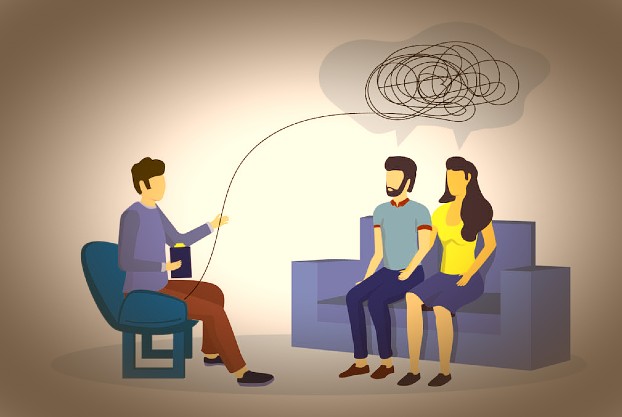Maintaining a healthy relationship is a fundamental aspect of our overall well-being. Whether it's a new romance or a long-term commitment, relationships require effort, understanding, and effective communication to thrive. However, even the strongest relationships can encounter challenges along the way. This is where couples counselling comes into play, offering valuable support and guidance to help couples navigate through difficulties and strengthen their bond.
Counselling for couples is a form of therapy specifically designed to address the unique dynamics and issues that arise within a romantic partnership.
Understanding Couples Counselling
Counselling aims to help couples understand and resolve the issues that are causing distress or dissatisfaction in their relationship. It offers a structured and collaborative approach to address common challenges such as communication problems, trust issues, and conflicts.
One of the primary goals of relationship counselling is to enhance communication between partners. Many relationship issues stem from miscommunication, misunderstandings, or ineffective expression of emotions and needs. A couples counsellor can facilitate open and honest dialogue, teaching couples effective communication techniques that promote understanding, active listening, and empathy.
The Process of Couples Counselling
A. Initial Assessment
The first session of relationship counselling is crucial in establishing a foundation for the therapeutic process. During this session, the therapist aims to gain a comprehensive understanding of the couple's needs, concerns, and goals.
B. Goal Setting
Collaborative goal setting is an essential aspect of counselling for couples. The therapist works closely with the couple to establish achievable and meaningful goals that reflect their desires for the relationship. These goals serve as guideposts throughout the counselling process, providing a clear direction for therapy sessions.
C. Individual and Joint Sessions
Counselling sessions may include a combination of individual sessions for each partner and joint sessions where the couple participates together. Individual sessions offer a space for each partner to explore their personal feelings, experiences, and perspectives.
Joint sessions involve both partners and focus on improving communication, resolving conflicts, and strengthening the emotional connection.
D. Techniques and Interventions
i. Active Listening: Couples learn to listen attentively and empathetically to their partner, fostering better understanding and connection.
ii. Conflict Resolution Strategies: Therapists teach couples practical strategies for managing conflicts, including techniques for de-escalation, compromise, and finding win-win solutions.
iii. Improving Emotional Intimacy: Couples work on enhancing emotional intimacy by expressing vulnerability, deepening trust, and creating a safe space for emotional expression.
iv. Communication Skills Training: Couples learn effective communication techniques such as "I" statements, assertiveness, and validation, enabling them to express their thoughts and emotions more clearly and respectfully.
Benefits of Couples Counselling
Relationship counselling offers numerous benefits that can significantly improve a relationship's quality and longevity. Some key benefits include:
- Improved Communication: Counselling equips partners with effective communication skills, enabling them to express their needs, emotions, and concerns in a healthy and constructive manner. This enhanced communication fosters understanding, minimizes misunderstandings, and strengthens the overall connection.
- Strengthened Emotional Connection: Through counselling, couples can deepen their emotional intimacy by fostering trust, empathy, and vulnerability.
- Enhanced Problem-Solving Skills: Counselling equips partners with practical problem-solving techniques that enable them to address conflicts and challenges more effectively.
The right therapist can provide the necessary support, guidance, and expertise to help couples navigate their relationship challenges effectively.Here are some tips for choosing a couples counsellor:
- Seek Professional Qualifications: Look for a counsellor who is trained and experienced in couples therapy. Consider their educational background, certifications, and any specialized training they have undergone in relationship counselling.
- Consider Therapist's Approach and Style: Different therapists have different therapeutic approaches and styles. Some may be more directive and solution-focused, while others may take a more exploratory and reflective approach.
- Evaluate Compatibility: Establishing a good rapport and feeling comfortable with your couples counsellor is crucial. Trust your intuition and assess whether you and your partner feel heard, understood, and respected during the initial consultation or session.
Implementing Counselling Strategies in Daily Life:
- Practice Active Listening: Give your full attention, maintain eye contact, and show empathy and understanding when your partner is expressing themselves.
- Communicate Openly and Respectfully: Avoid blaming, criticizing, or resorting to defensive behaviors during disagreements.
- Schedule Regular Check-Ins: Set aside regular time to have open and honest conversations with your partner. Use this time to discuss any concerns, share appreciations, and ensure that you are staying connected emotionally.
- Practice Problem-Solving Techniques: When conflicts arise, utilize the conflict resolution techniques learned in therapy. This includes taking turns expressing your viewpoints, seeking compromises, and actively working towards win-win solutions.
- Show Appreciation and Affection: Express love, appreciation, and affection for your partner regularly. Small gestures like kind words, hugs, or surprises can go a long way in fostering emotional connection and strengthening the relationship.
- Seek Ongoing Growth: Recognize that the work done in relationship counselling is not limited to the therapy sessions alone. Commit to ongoing personal growth and relationship development by continuously practicing the techniques and strategies learned in therapy.
Incorporating counselling strategies into daily life requires consistent effort and practice. It is a journey that requires both partners to be committed to growth, understanding, and maintaining a healthy relationship. But with the right guidance you and your partner can achieve a fulfilling relationship together!

